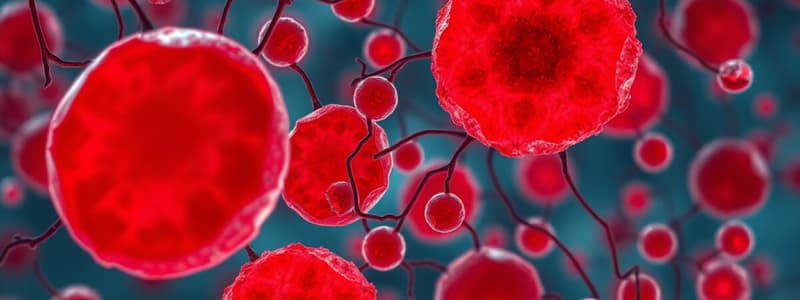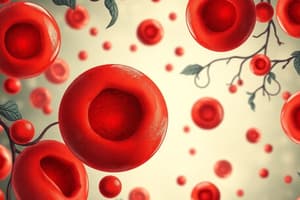Podcast
Questions and Answers
What are erythrocytes?
What are erythrocytes?
Erythrocytes are pliable cells responsible for the transport and release of oxygen and carbon dioxide in the blood.
Erythrocytes lack a nucleus.
Erythrocytes lack a nucleus.
True (A)
What is the average lifespan of a red blood cell in circulation?
What is the average lifespan of a red blood cell in circulation?
125 days
How many red blood cells are produced per second by the adult bone marrow?
How many red blood cells are produced per second by the adult bone marrow?
What are the three main functions of erythrocytes?
What are the three main functions of erythrocytes?
All human blood contains erythrocytes, leukocytes, and thrombocytes.
All human blood contains erythrocytes, leukocytes, and thrombocytes.
What is formed when red blood cells clump together?
What is formed when red blood cells clump together?
What are antigens?
What are antigens?
Antigens are also called agglutinogens.
Antigens are also called agglutinogens.
Antibodies are also called agglutinins.
Antibodies are also called agglutinins.
The presence or absence of erythrocyte antigens is determined genetically.
The presence or absence of erythrocyte antigens is determined genetically.
The vast majority of erythrocyte antigens are weak.
The vast majority of erythrocyte antigens are weak.
What are the three main blood group antigens?
What are the three main blood group antigens?
The corresponding antibodies, normally absent if the antigen is present, are designated as ______.
The corresponding antibodies, normally absent if the antigen is present, are designated as ______.
What are the two blood groups that are commonly examined in blood typing?
What are the two blood groups that are commonly examined in blood typing?
Which of the following statements is true about blood group A?
Which of the following statements is true about blood group A?
Transfusing blood group B into a recipient with blood group B will result in no reaction.
Transfusing blood group B into a recipient with blood group B will result in no reaction.
Transfusing blood group A into a recipient with blood group B will not cause a reaction.
Transfusing blood group A into a recipient with blood group B will not cause a reaction.
Transfusing blood group B into a recipient with blood group O will cause a reaction.
Transfusing blood group B into a recipient with blood group O will cause a reaction.
What is the name of the clinical condition that occurs when incompatible blood types are mixed resulting in agglutination?
What is the name of the clinical condition that occurs when incompatible blood types are mixed resulting in agglutination?
What are some common symptoms of a transfusion reaction?
What are some common symptoms of a transfusion reaction?
Transfusion reactions are only caused by incompatibility in the ABO blood group.
Transfusion reactions are only caused by incompatibility in the ABO blood group.
What is another name for the Rh blood group?
What is another name for the Rh blood group?
The Rh blood group was discovered in 1940.
The Rh blood group was discovered in 1940.
How is the Rh blood group determined?
How is the Rh blood group determined?
The presence or absence of the D antigen determines whether an individual is Rh positive or negative.
The presence or absence of the D antigen determines whether an individual is Rh positive or negative.
Rh-negative individuals have the D antigen on their red blood cells.
Rh-negative individuals have the D antigen on their red blood cells.
Rh-negative individuals have anti-D antibodies in their plasma.
Rh-negative individuals have anti-D antibodies in their plasma.
Rh-positive individuals never develop anti-D antibodies.
Rh-positive individuals never develop anti-D antibodies.
It is safe to transfuse Rh-positive blood into an Rh-negative recipient.
It is safe to transfuse Rh-positive blood into an Rh-negative recipient.
It is safe to transfuse Rh-negative blood into an Rh-positive recipient.
It is safe to transfuse Rh-negative blood into an Rh-positive recipient.
Rh-positive individuals can safely receive Rh-negative blood.
Rh-positive individuals can safely receive Rh-negative blood.
Rh-negative individuals can safely receive Rh-positive blood.
Rh-negative individuals can safely receive Rh-positive blood.
The Rh blood group is clinically significant.
The Rh blood group is clinically significant.
Anti-D antibodies are typically found in the plasma of Rh-positive individuals.
Anti-D antibodies are typically found in the plasma of Rh-positive individuals.
Rh-negative mothers who have been exposed to Rh-positive blood during pregnancy have a higher risk of developing anti-D antibodies.
Rh-negative mothers who have been exposed to Rh-positive blood during pregnancy have a higher risk of developing anti-D antibodies.
Anti-D antibodies can cross the placenta and affect the fetus.
Anti-D antibodies can cross the placenta and affect the fetus.
Anti-D antibodies do not pose a risk to the fetus unless the fetus is Rh-positive.
Anti-D antibodies do not pose a risk to the fetus unless the fetus is Rh-positive.
A first Rh-negative pregnancy does not increase the risk of developing anti-D antibodies in the mother.
A first Rh-negative pregnancy does not increase the risk of developing anti-D antibodies in the mother.
A second Rh-negative pregnancy increases the risk of developing anti-D antibodies in the mother.
A second Rh-negative pregnancy increases the risk of developing anti-D antibodies in the mother.
A second Rh-negative pregnancy after an Rh-positive pregnancy carries a higher risk of developing anti-D antibodies in the mother.
A second Rh-negative pregnancy after an Rh-positive pregnancy carries a higher risk of developing anti-D antibodies in the mother.
Anti-D antibodies can only be developed during pregnancy.
Anti-D antibodies can only be developed during pregnancy.
Anti-D antibodies are not harmful during a first pregnancy.
Anti-D antibodies are not harmful during a first pregnancy.
Anti-D antibodies are harmful during a second pregnancy.
Anti-D antibodies are harmful during a second pregnancy.
There is no way to prevent the development of anti-D antibodies in Rh-negative mothers.
There is no way to prevent the development of anti-D antibodies in Rh-negative mothers.
Rh immunoglobulin or RhoGAM is effective at preventing the development of anti-D antibodies in Rh-negative mothers.
Rh immunoglobulin or RhoGAM is effective at preventing the development of anti-D antibodies in Rh-negative mothers.
RhoGAM can be given to Rh-negative mothers before, during, or after pregnancy.
RhoGAM can be given to Rh-negative mothers before, during, or after pregnancy.
RhoGAM is a cure for hemolytic disease of the newborn (HDN).
RhoGAM is a cure for hemolytic disease of the newborn (HDN).
RhoGAM is only effective if given during pregnancy.
RhoGAM is only effective if given during pregnancy.
RhoGAM is a safe and effective treatment for pregnant Rh-negative women.
RhoGAM is a safe and effective treatment for pregnant Rh-negative women.
Hemolytic disease of the newborn (HDN) is a serious condition.
Hemolytic disease of the newborn (HDN) is a serious condition.
HDN is caused by the mother's immune system attacking the fetus's red blood cells.
HDN is caused by the mother's immune system attacking the fetus's red blood cells.
HDN is only a risk for mothers who are Rh-negative and have been exposed to Rh-positive blood.
HDN is only a risk for mothers who are Rh-negative and have been exposed to Rh-positive blood.
HDN can be prevented.
HDN can be prevented.
HDN is a common condition.
HDN is a common condition.
HDN is a treatable condition.
HDN is a treatable condition.
HDN can be fatal.
HDN can be fatal.
HDN is often preventable.
HDN is often preventable.
Flashcards
Erythrocyte Pliability
Erythrocyte Pliability
Erythrocytes (red blood cells) are flexible and can bend and twist as they move through blood vessels.
Erythrocyte Lifespan
Erythrocyte Lifespan
Red blood cells lack a nucleus, which limits their lifespan to an average of 125 days in circulation.
Red Blood Cell Production
Red Blood Cell Production
The bone marrow constantly produces new red blood cells at a rate of 2.5 million per second, replacing those that are destroyed.
Red Blood Cell Function: Gas Transport
Red Blood Cell Function: Gas Transport
Signup and view all the flashcards
Red Blood Cell Function: Buffering
Red Blood Cell Function: Buffering
Signup and view all the flashcards
Red Blood Cell Function: Coagulation
Red Blood Cell Function: Coagulation
Signup and view all the flashcards
Blood Type Determination
Blood Type Determination
Signup and view all the flashcards
Blood Type Incompatibility: Agglutination
Blood Type Incompatibility: Agglutination
Signup and view all the flashcards
Antigens and the Immune System
Antigens and the Immune System
Signup and view all the flashcards
Antibodies: Immune Defenders
Antibodies: Immune Defenders
Signup and view all the flashcards
Alternative Names: Agglutinogens and Agglutinins
Alternative Names: Agglutinogens and Agglutinins
Signup and view all the flashcards
Blood Type Inheritance
Blood Type Inheritance
Signup and view all the flashcards
Antigen Diversity
Antigen Diversity
Signup and view all the flashcards
Major Blood Groups: ABO and Rh
Major Blood Groups: ABO and Rh
Signup and view all the flashcards
Blood Type A
Blood Type A
Signup and view all the flashcards
Blood Type B
Blood Type B
Signup and view all the flashcards
Blood Type AB
Blood Type AB
Signup and view all the flashcards
Blood Type O
Blood Type O
Signup and view all the flashcards
Universal Donor: Type O
Universal Donor: Type O
Signup and view all the flashcards
Universal Recipient: Type AB
Universal Recipient: Type AB
Signup and view all the flashcards
Rh Blood Group: Discovery
Rh Blood Group: Discovery
Signup and view all the flashcards
Rh Antigen: Weakness
Rh Antigen: Weakness
Signup and view all the flashcards
Rh+ Blood Type
Rh+ Blood Type
Signup and view all the flashcards
Rh- Blood Type
Rh- Blood Type
Signup and view all the flashcards
Rh- individuals: Anti-D Antibodies
Rh- individuals: Anti-D Antibodies
Signup and view all the flashcards
Rh- individuals & Rh+ Transfusion
Rh- individuals & Rh+ Transfusion
Signup and view all the flashcards
Rh- Individuals & Rh+ Transfusion: Subsequent Reactions
Rh- Individuals & Rh+ Transfusion: Subsequent Reactions
Signup and view all the flashcards
Transfusion Reactions Overview
Transfusion Reactions Overview
Signup and view all the flashcards
Transfusion Reaction Symptoms
Transfusion Reaction Symptoms
Signup and view all the flashcards
Rh+ to Rh-: Agglutination
Rh+ to Rh-: Agglutination
Signup and view all the flashcards
Study Notes
Erythrocytes
- Erythrocytes are flexible cells that bend and twist as they pass through blood vessels.
- They lack a nucleus and survive an average of 125 days in circulation.
- The average adult has approximately 5 million erythrocytes per microliter of blood.
- Bone marrow produces about 2.5 million new red blood cells per second to replace those that are destroyed.
Functions of Erythrocytes
- Transport oxygen and carbon dioxide.
- Participate in maintaining blood pH (buffer system).
- Play a minor role in blood clotting.
Blood Antigens
- Antigens are chemical substances that trigger an immune response when introduced into an organism.
- When a foreign antigen enters, the immune system creates antibodies that react with the antigen and neutralize it.
- Antigens on red blood cells determine blood type (e.g., A, B, O, Rh).
Blood Typing and Transfusions
- ABO blood types are determined by the presence of A and/or B antigens on red blood cells and corresponding antibodies in the plasma.
- If incompatible blood types are mixed, the recipient's antibodies will cause the donor's red blood cells to agglutinate (clump together).
- Agglutination can block blood vessels and cause serious problems.
- Rh blood type is determined by the presence of the Rh antigen on red blood cells.
- If an Rh-negative person receives Rh-positive blood, their body will produce antibodies against the Rh antigen.
Transfusion Reactions
- Incompatible blood transfusions cause serious reactions, ranging from mild discomfort to potentially life-threatening complications.
- The severity of reactions depends on the amount of incompatible blood transfused.
- Symptoms may include fever, chills, difficulty breathing, and pain in the chest or neck. In severe cases, organ damage could occur.
Studying That Suits You
Use AI to generate personalized quizzes and flashcards to suit your learning preferences.




